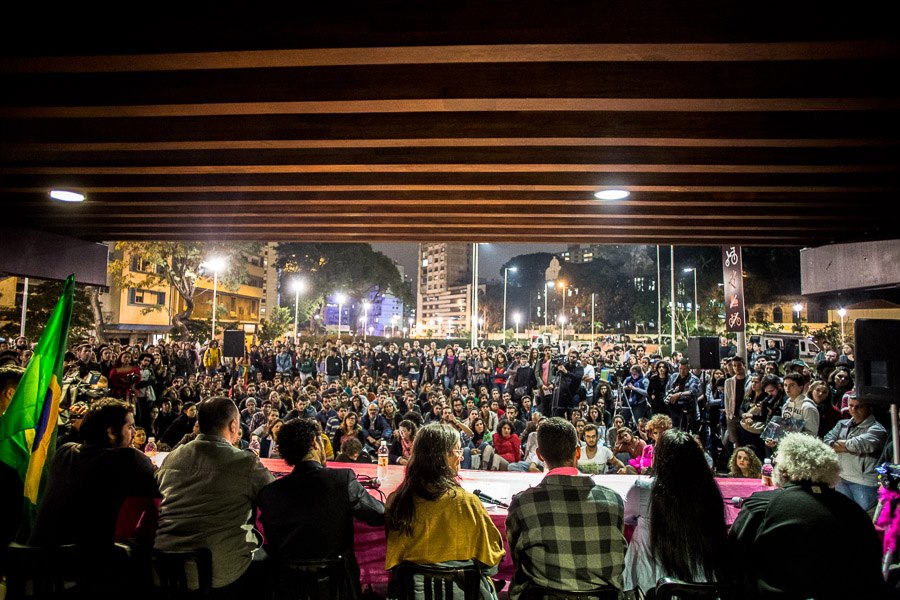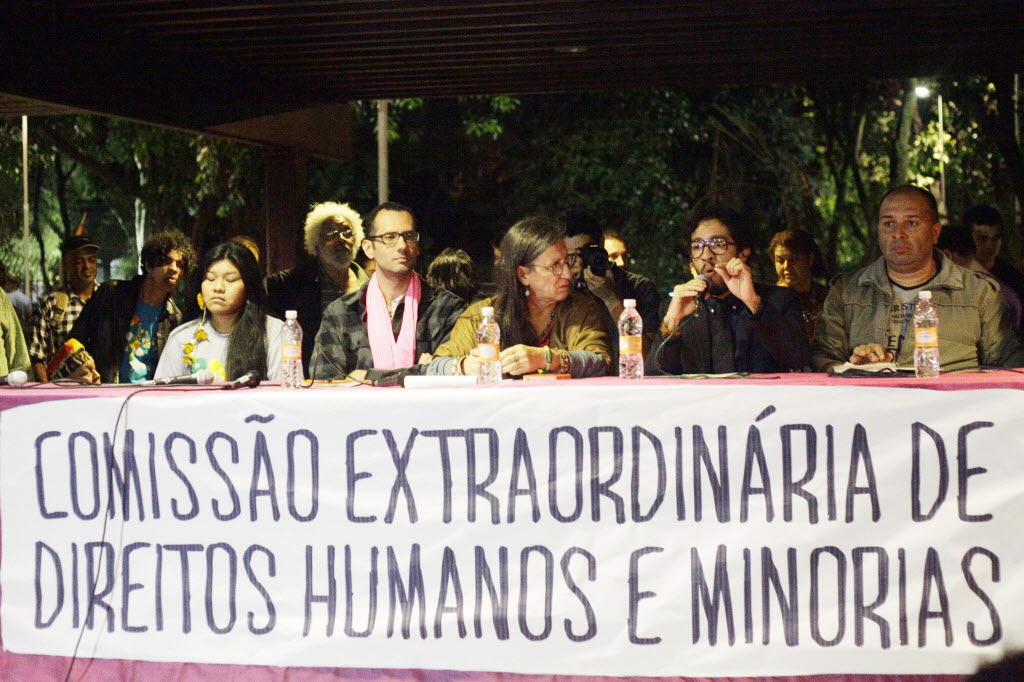Marco Feliciano, a man accused of homophobia and racism, has bizarrely managed to take over as Brazil’s human rights commissioner. So the progressive movements coalescing on the streets of downtown São Paulo set up their own commission, above.
By Claire Rigby
‘Life’s too short to live in São Paulo’. So says a piece of graffiti currently doing the rounds on Tumblr. More than in most cities, there’s a powerful disconnect in SP between what happens on the street and what happens in the rest of people’s lives. In whole swathes of the city – in its more affluent areas especially – closed condominiums, car-loving Paulistanos and a sense of insecurity combine with who knows what other factors to make the streets a place you pass through, rather than somewhere to halt, hang out, and connect with other people.
Recently, though, a surge of interest in reclaiming the streets as a space for culture, parties and politics has given rise to a raft of interesting events and movements – Existe Amor em SP; BaixoCentro festival; Voodoohop and Santo Forte parties, to name but a few – and this coming Saturday, an open-air Anhangabaú da Feliz Cidade festival, in the heart of SP’s old Centro.
Except to the extent that reclaiming street space itself can be said to be political, SP’s ‘occupy the streets’ movement has thus far remained formally politically neutral, barring a flirtation in some quarters with the election campaign of SP’s current mayor, Fernando Haddad. But there are signs that the ‘occupy the streets’ common denominator of the various groups might coalesce into a more decisively political force.
Rights on
In one of the most powerful examples of that, last Thursday night at Praça Roosevelt – sometimes referred to as ‘Praça Rosa’, after the thousands-strong spontaneous festival that gave birth to the Existe Amor em SP movement last October (see ‘Coming up from the street‘), here on the From Brazil blog – a first meeting took place of the Extraordinary Commission on Human Rights and Minorities (Comissão Extraordinaria de Direitos Humanos e Minorias). To the clack-and-roll sound of skateboarders practicing in the square below, and accompanied by a stream of curious passers-by, walking their dogs and their babies in the square’s recently refurbished expanses, 200-300 people gathered for the newly formed Commission’s first ‘public audience’, as it was billed.
The Commission, a grassroots, autonomous body, sprang up in response to the appointment earlier this year of evangelical preacher Marco Feliciano as the president of Brazil’s Congressional Human Rights and Minorities Commission. The pastor’s appointment was about as logical as setting a fox to guard a henhouse, according to the Financial Times and the move’s many opponents, who were shocked off the internet into mobilising in a series of real-life protests nationwide, including two well-attended marches in São Paulo.
Feliciano is accused of rampant, out-of-the-closet homophobia: he has said that ‘love between people of the same sex leads to hatred, crime and rejection’, and claims that ‘many’ members of his congregation, affiliated to the Assembleia de Deus evangelical church, have stopped being gay as a result of spiritual assistance. In another oddly perverse commission appointment in March, the Mato Grosso soya baron Blairo Maggi was appointed president of the Congressional Environment commission, in a move that can be attributed, perhaps, to the wheeler-dealerism that goes in Brazil’s coalition-based politics – one party is given this commission position for that support; another is given control of this government department for backing for that set of policies.
Fox in the henhouse
Quite what someone like Marco Feliciano would want with leadership of the human rights commission started to become clear this week, when in one of his first actions as president of the commission, the pastor rushed through a proposal for the reversal of a 1999 prohibition on psychologists taking part in any treatments purporting to ‘treat’ or ‘cure’ homosexuality.
The nascent Extraordinary Commission on Human Rights and Minorities, while spurred into action by Feliciano’s appointment, is far from being all about the pastor, though: its first meeting was chaired by a lineup of speakers on subjects as diverse as is the remit of the formal Congressional committee: representatives from indigenous and black rights groups as well as the Existe Amor en SP movement sat alongside federal congressman and LGBT activist Jean Wyllys, and the much-loved cartoonist and transgender community figurehead, Laerte Coutinho.
An open mike attracted a stream of speakers, including from the trans community, the movement against the forcible internment of crack users downtown, and including an impassioned speech by the SP councilman Nabil Bonduki, on a new Bill to outlaw funk parties – outdoor, illegal raves held mainly in favelas.
Watch this space: the forces coalescing in opposition to Feliciano and his ilk look likely to branch out into ever more interesting political configurations and – sealed during the last moments of the Extraordinary Commission’s first session, in which congressman Wyllys planted a huge kiss on Laerte, to the crowd’s delight – ever more fruitful partnerships.
The opening photo was taken from NINJA



